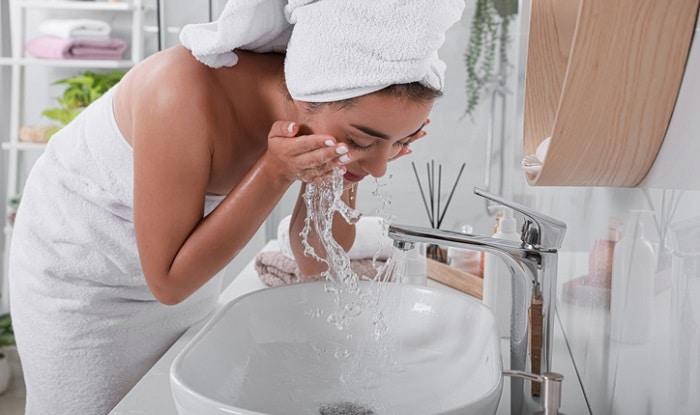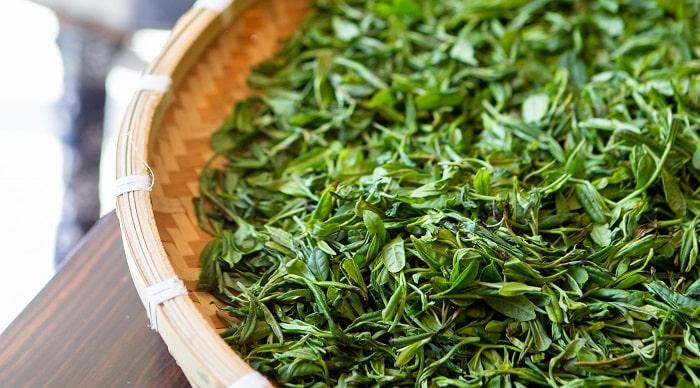Oily skin can be a real burden. Not only is it a pain to manage, but oily skin can also cause distress and problems with self-esteem. Fortunately, there are ways to manage oily skin.
If you have oily skin, keep reading to learn what may be causing it, common solutions, and how you may find help through supplements.
What causes oily skin?
Before we get into the causes of oily skin, let’s define it.
Oily skin is pretty much what it sounds like. It occurs when the skin on your face appears to be oily, greasy, or shiny. Oily skin can be relentless and get worse throughout the day.
Many people with oily skin feel uncomfortable because it causes issues like excessive shine, enlarged pores, and even acne.1 But oily skin can affect more than just your physical appearance.
A mental health study on the impact of oily skin found that participants struggled with self-esteem, self-image, self-consciousness, and social functioning. The study also pointed out that people with oily skin often spend extra time at the dermatologist or in the bathroom cleaning their face, which can be frustrating for some.2
Oily skin is caused by excess sebum. Sebum is a naturally occurring oil-like substance that comes from sebaceous glands on your face and other areas of your body. Your skin needs sebum for moisturization and protection.
However, some people have sebaceous glands that over-produce sebum, and this can lead to oily skin. This may be due to large pores or other factors.1
But the question still stands, why do some people have large pores or over-active sebaceous glands?
Oftentimes, the cause of your oily skin may be out of your hands. Common causes of oily skin include:
- Genetics: Whether you like it or not, oily skin can run in the family.
- Age: Your skin produces more sebum when you’re younger, which may be why teens and young adults tend to struggle with oily skin and acne more than older adults.
- Environment: Oily skin is more common in humid environments.
- Skincare routine: Using the wrong skincare products, washing your face too much, or skipping out on moisturizer can cause your skin to become oily.
Oily skin may also be more likely in men, women during ovulation, and African Americans.3
Regardless of the cause of your oily skin, options are available.
Common remedies for oily skin

While oil on your face isn’t necessarily a bad thing (in fact, you need some!), you can have too much.
Oily skin can lead to acne and clogged pores. People with oily skin often seek remedies that can help them control excess oil and reduce breakouts.
To reduce oily skin, the American Academy of Dermatology suggests that you do the following:
- Wash your face at least twice a day, plus after exercise.
- Use oil-free skincare products, face wash, and makeup.
- Use gentle face cleansers, like a foaming wash.
- Apply moisturizer and sunscreen to your face daily.
- Avoid touching your face throughout the day.
- Avoid sleeping in makeup.4
You can also use face-blotting sheets to absorb oil as needed during the day. These can help reduce the appearance of oil and shine. Working with a dermatologist to find the best skincare routine for your skin type may also be beneficial.
Can supplements help with oily skin?
Various supplements have been researched for their potential benefits for oily skin. From vitamins to minerals to antioxidants, some supplements for oily skin may improve your symptoms.
Here’s a look at the best supplements for oily skin:
1. Niacinamide
Niacinamide, a derivative of niacin, or vitamin B3, has been well-researched and found to have potential benefits for aging skin. When applied topically, it is also thought to help reduce oily skin.
A small study in which two clinical trials were performed found that a topical solution containing 2% niacinamide reduced sebum excretion rate in Japanese participants. The second part of the study found that the same solution decreased the casual sebum levels in Caucasian participants.5
These results show that niacinamide may work by reducing the amount of sebum excreted by sebaceous glands and, thus, reducing oil production.
A more recent study using a 4% niacinamide topical solution concluded that using niacinamide along with a standard, oil-free facial cleanser can improve moisturization and complexion.6
2. Retinoids
Derived from vitamin A, retinoids have been used for years in the skincare industry. Retinoids are thought to have many beneficial skin effects, including reducing sebum production.
Retinoids have been found to reduce both the size of sebaceous glands and how much sebum they excrete.3 This means that using topical retinoids can help reduce oil production and shiny skin.
3. Green tea

Green tea contains polyphenols, or antioxidants, that have been researched for their potential uses for oily skin reduction.
A review from 2017 looked at several studies using both oral and topical forms of tea leaves. The evidence suggests that polyphenols in green tea may reduce the amount of sebum produced by sebaceous glands.7
4. L-carnitine
A naturally occurring substance, L-carnitine is usually associated with energy production in your body.
However, one in vivo study found that it may also be useful in for oily skin. In the study, a formula that contained 2% L-carnitine was applied to the sebaceous glands for 3 weeks. At the end of the study, sebum production was significantly reduced in the cells.8
Although these results are promising, more human trials are needed when it comes to the potential use of L-carnitine for oily skin.
5. Vitamin B6
Vitamin B6, also known as pyridoxine, could be another tool you can use for oily skin.
Taking 40 mg of vitamin B6 daily has been associated with improvements in oily skin and other changes commonly associated with premenstrual syndrome.9
6. Pantothenic acid
Vitamin B5, or pantothenic acid, has been linked to improvements in oily skin.
Vitamin B5 may reduce the amount of oil produced by the sebaceous glands. It is thought that pantothenic acid increases the amount of Coenzyme A, which in turn increases the rate of oil breakdown.10
7. Vitamin D

People with certain types of acne, like nodulocystic acne, have been found to have low levels of vitamin D. Because of this, researchers have looked at the relationship between vitamin D and oil production.
Through this research, vitamin D has been found to inhibit the growth of sebaceous gland cells. And with fewer sebaceous glands around, sebum production will be reduced.11
8. Zinc
Zinc is an important mineral linked to several health benefits, one of which is oil production.
It has been proposed that zinc can help clear acne through the reduction of sebum production. Some people with acne vulgaris have been found to have a zinc deficiency, and zinc supplementation or use may help improve this issue.12
Can diet help with oily skin?
When you have oily skin, you probably want to try different things to try to make it better.
Many people wonder if diet has anything to do with oily skin. And the answer is, maybe.
Plenty of blog posts and websites claim that certain foods cause your skin to become oily while others can magically clear your skin. However, it’s best to look to the research when it comes to your diet’s effect on oily skin.
While many studies have been performed on the relationship between food and skin health, no single diet has been found to be the best for clear skin. This means there is no evidence that specific foods will improve your skin if eaten.
But what we do know is that an overall healthy diet certainly won’t hurt your skin. The best thing you can do for your skin is to eat a varied diet that contains plenty of fruits, vegetables, whole grains, lean protein, and healthy fats.
There’s always room for fun foods and drinks in a healthy diet, and it’s not necessary to avoid or restrict these for less oily skin. However, it is important to note that a typical Western diet that is high in animal products, high-fat foods, and foods high in added sugar has been associated with increased oil production and adult acne.13
When to see a doctor for oily skin

If the skincare techniques or supplements shared here don’t work for the management of your oily skin, you may need something stronger, like a prescription.
Systemic, oral medications for oily skin are available. These can include isotretinoin, spironolactone, oral contraceptives, or hormone therapy.3 There are more potential risks and side effects associated with medications for oily skin, however, so be sure to do your research and get all your questions answered by your healthcare provider before starting one.
Consider trying supplements for oily skin
Oily skin is caused by an over-production of sebum, or oil, from sebaceous glands on the face. It can leave you feeling frustrated and self-conscious. But solutions are available.
In addition to conventional oily skin remedies and good facial hygiene, various supplements may be able to help. Research on supplements for oily skin is still emerging, and more human trials are needed, but many show promise.
Be sure to talk with your healthcare provider before starting new supplements. They may be able to tell you about any new research or let you know which supplement is the best option for you.
 About Brittany Lubeck
About Brittany Lubeck
Brittany Lubeck is a registered dietitian and nutrition writer. She has a Bachelor of Science in Dietetics, a Master of Science in Clinical Nutrition, and began her career as a clinical dietitian. Brittany has always enjoyed research and loves that she can help people learn more about nutrition through her writing.
Sources:
1.. Maia Campos, P.M.B.G., M.O. Melo, & D.G Mercurio, “Use of Advanced Imaging Techniques for the Characterization of Oily Skin.” Frontiers in Physiology 254, no. 10 (2019).
2. Arbuckle, R., M.J. Atkinson, et al. “Patient experiences with oily skin: The qualitative development of content for two new patient reported outcome questionnaires.” Health and Quality of Life Outcomes 80, no. 6 (2008).
3. Kern, Dan. “Why Do Some People Have Oilier Skin than Others?” The American Acne Association. Acne.org.
4. “How To Control Oily Skin.” American Academy of Dermatology Association. Aad.org.
5. Draelos, Z.D., A. Matsubara, & K. Smiles. “The effect of 2% niacinamide on facial sebum production.” Journal of Cosmetic and Laser Therapy 2, no. 8 (2006): 96-101.
6. Santos-Caetano, J. P., C.F. Gfeller, et al. “Cosmetic benefits of a novel biomimetic lamellar formulation containing niacinamide in healthy females with oil, blemish-prone skin in a randomized proof-of-concept study.” International Journal of Cosmetic Science 1, no. 42 (2019): 29-35.
7. Saric, S., M. Notay, & R. Sivamani. “Green Tea and Other Tea Polyphenols: Effects on Sebum Production and Acne Vulagris.” Antioxidants 1, no. 6 (2017).
8. Peirano, R., S.K. Motlagh, et al. “Topically applied L-carnitine effectively reduces sebum secretion in human skin.” Journal of Cosmetic Dermatology 1, no. 11 (2012): 30-36.
9. Ebrahimi, E., et al. “Effects of Magnesium and Vitamin B6 on the Severity of Premenstrual Syndrome Symptom” Journal of Caring Sciences 4, no. 1 (2012): 183-189.
10 Dach, Jeffrey. “Pantothenic Acid, Vitamin B5 for Acne.” Jeffrey Dach MD. Jeffreydachmd.com.
11. Yildizgören, M.., & A.K. Togral. “Preliminary evidence for vitamin D deficiency in nodulocystic acne.” Dermato-Endocrinology 1, no. 6 (2014).
12. Gupta, M., V.K. Mahajan, et al. “Zinc Therapy in Dermatology: A Review.” Dermatology Research and Practice (2014).
13. Penso, L., M. Tauvier, et al. “Association Between Adult Acne and Dietary Behaviors. Findings From the NutriNet-Sante Prospective Case Study.” Journal of the American Medical Association 8, no. 156 (2020): 854-862.